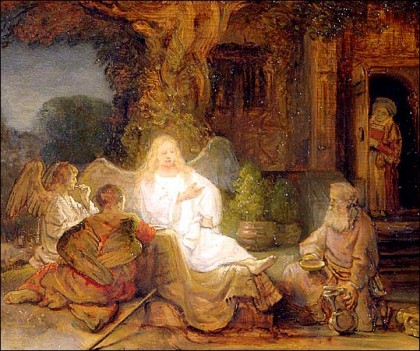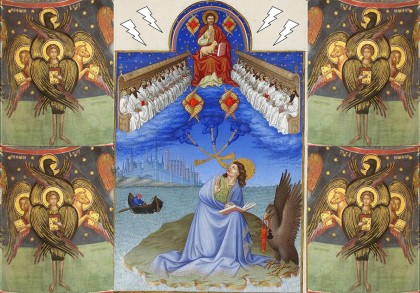Beltane Sumi-e Moon
![]() Been thinking about revelation. In a way I’m not sure is new, but I don’t recall seeing it anywhere. So, we have all these sacred scriptures. What makes them sacred? The claim is their autographic nature, written in some mysterious way by the hand of a god or gods. I’m going to bracket the claim of divine authorship and ask not about the content of the tales, at least not the content usually involved in exegesis and hermeneutics, but about the way revelation shows up in them.
Been thinking about revelation. In a way I’m not sure is new, but I don’t recall seeing it anywhere. So, we have all these sacred scriptures. What makes them sacred? The claim is their autographic nature, written in some mysterious way by the hand of a god or gods. I’m going to bracket the claim of divine authorship and ask not about the content of the tales, at least not the content usually involved in exegesis and hermeneutics, but about the way revelation shows up in them.
I came to this idea at a mussar class last week when we were discussing Abraham (Avram) as an example of emunah, or grace/faith. Emerson came to mind, his words about having a revelation to us and not the dry bones of theirs. We were discussing Abraham as a model of emunah. What we’re trying to do, I said, is learn from Abraham’s story why he trusted God. We’re trying to learn through the veil of thousands of years and through the words written about Avram. Words, for most of us, in translation. Words we know passed through many different redactors. We want to know how Avram experienced revelation otherwise why would we find the stories sacred?

God appears to Abram. God comes to him in a vision. God speaks to him. God comes to Abram in sleep, in darkness and dread: “As the sun was going down, a deep sleep fell on Abram; and lo, a dread and great darkness fell upon him. 13 Then the Lord said to Abram…” Gen. 15:12-13a, RSV Abram asks God how he will know that what he says is true.
It came to me then that the fundamental question of Biblical, Vedic, or Koranic texts is an epistemological one, not first a metaphysical one or a hermeneutical one. That is, how does revelation show up? How do we know it when we see it? How might we realize Emerson’s plea for a revelation to us, not the dry bones of theirs? What is the nature of revelation? How can we experience it now, not rely on an ancient game of telephone?
Well, one way might be to use the sacred texts not as either mythology or divine communication through their content, but as clues to the nature of revelation itself. How, in other words, did the sacred texts represent the experience of revelation? What was it like? How did it become confirmed as revelation? At least to those reported to have experienced it directly?
Please note that I’m not making an assumption here about the source of revelation or its truth claims as evidence of divine communication. I’m asking the question, what has revelation looked like? How has the experience of revelation been identified? What are its marks? Can we seek it? Might we find it if we did?

Going back to Abram. Let’s use him not as an example of faith or of covenant or of divine nation-building, but as an example of one who experiences direct revelation. What is it like? How does he know (the epistemological question) that he has experienced revelation? The writers of the story, or the editors of the oral tradition when it was written down, or the embellishers and editors of the story as it passed both through oral transmission and different textual editions, use particular verbs: Avram heard, saw (a vision, an appearance), dreamed, felt (darkness and dread), was delivered (defeat of enemies).
Following Avram’s story we might say that revelation comes through language, through emotions, through dreams, through particular actions to him. Not very distinctive in its medium, then, at least not distinctive from usual human experience. So what is it about a communication or an interpretation of an action that identifies it as special, different, sacred?
 My first suspicion is that it is much like the nativity story, and perhaps the crucifixion and resurrection narratives, too, ex post facto events created to explain the origins and influence of remarkable individuals. Who would receive communications from beyond this reality? Individuals who’ve already been established as significant, powerful, influential. Like that guy Abraham, warlord, father of many children, father of our nation. How did he get where he is? He heard the still small voice. He understood things others of us missed. He was in touch with, what? Something many of us ignored, perhaps.
My first suspicion is that it is much like the nativity story, and perhaps the crucifixion and resurrection narratives, too, ex post facto events created to explain the origins and influence of remarkable individuals. Who would receive communications from beyond this reality? Individuals who’ve already been established as significant, powerful, influential. Like that guy Abraham, warlord, father of many children, father of our nation. How did he get where he is? He heard the still small voice. He understood things others of us missed. He was in touch with, what? Something many of us ignored, perhaps.
But, let’s say for the sake of this investigation that it’s not only this reading backwards into an important person’s life, well after the fact; but, that revelation is just that. Revelatory. Forget of what for now. Why are some dreams revelatory? Why are some appearances revelatory? Why are some inner voices revelatory?

Artist: Andrea Mantegna
Date made: about 1458-60
Source: http://www.nationalgalleryimages.co.uk/
Contact: picture.library@nationalgallery.co.uk
Copyright © The National Gallery, London
I’m not sure we can penetrate this. We have the after story. After the garden. After the promise to Avram. After Sarah’s miraculous births. After the Garden of Gethsemane. After the journey by night to the Temple Mount. After the birth of Krishna. Yet how can we know the inner experience of personages from thousands of years in the past? We barely understand our own inner experience. And if we can’t answer the epistemological question, how did Avram know what he claimed to know about God, then we can’t decide the value of his claims. Aside from their value as myth and legend.
Perhaps then Emerson’s quest for a religion of revelation to us rather than the dry bones of theirs is fruitless. Perhaps. I would say and will stop here for now, that the only way we can understand the nature of revelation is to search for its marks in our own lives. We will not find answers in ancient texts because the layers, the barriers to knowing the mind of another becomes insurmountable in them. What has been revealed to you? What was its source? How do you know?
